- VisitSupport Happy HollowDONATE TODAYExploreSupport Happy HollowDONATE TODAYLearnSupport Happy HollowDONATE TODAYSupportToday’s Hours: CLOSED
Happy Hollow Blog
Golden Years at the Zoo
July 10, 2020
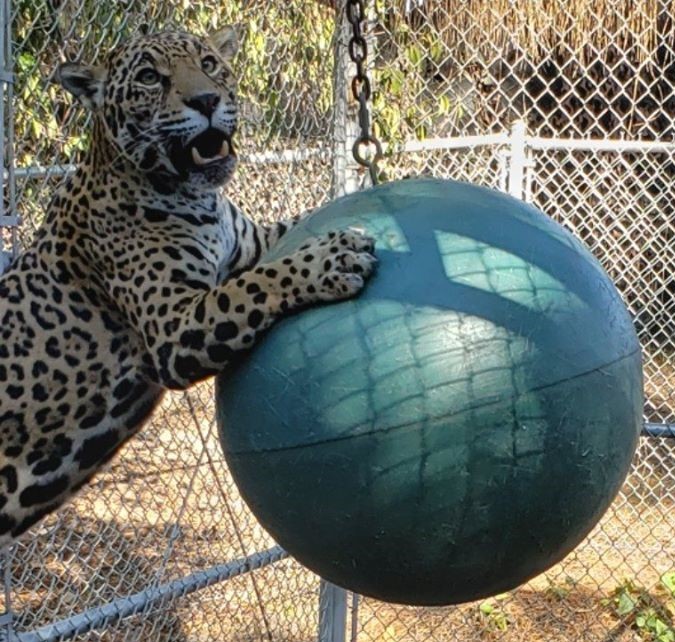
With modern veterinary medicine, nutrition science, successful care, and ever-evolving standards of husbandry – many animals living under human care at zoos can live comfortably well past the average lifespan of their wild counterparts.
Of course, longer life spans also comes with age-related symptoms, as well as new challenges for veterinarians.
“Caring for aging animals can be a lot of work,” says Zoo Manager Kevin Hertell. “But it’s all part of our commitment to every animal at the Zoo.” Even the “retirees” (animals that live off exhibit) receive dedicated, professional and quality attention and care each and every day.
Happy Hollow’s preventive wellness programs ensures that every animal receives a routine examination or evaluation schedule. For some, it’s an annual exam, but just like with pets – veterinary care is provided as needed if anything arises in-between.
“It depends a lot on the species,” says Veterinary Technician Rachel Atkins. “Some species are more prone to certain diseases or age related conditions. We have several animals that are evaluated more frequently to help manage age related issues, such as arthritis, or in some cases cancer.”
It’s not always easy getting older, but the Happy Hollow zoo team pour their hearts into providing excellent compassionate care for each and every animal.
Meet our resident seniors
Kianto
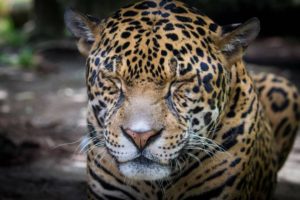
Kianto the jaguar came to Happy Hollow in 2018 with several age related conditions, including arthritis in all of his legs. (Which is being carefully monitored and treated.) In late May, when he started losing interest in food, the veterinary team jumped into action. After several veterinary examinations, and testing, Kianto was diagnosed with EPI, Exocrine Pancreatic Insufficiency. Much to the relief of his care team, this is something that can be treated with special enzymes, or supplements that go in his food.
Misti
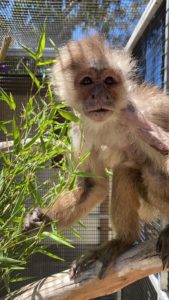
Misti is Happy Hollow’s oldest primate – a 39 year old capuchin monkey. This winter, Misti moved from her outdoor habitat into a climate controlled building to ensure that she would not get cold, or lose weight. Despite some sensitive tummy and age related skin issues that are carefully monitored and treated, she is in great health. Due to her advanced age, Misti’s care team has decided that retirement is the safest way for Misti to live out her final years at the Zoo. She now has a permanent home behind-the-scenes, where she can decide whether she wants to be indoors or outdoors.
Roni
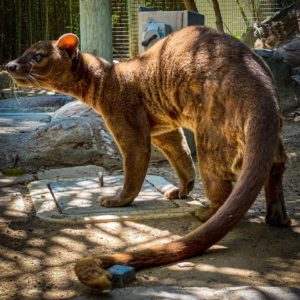
In spite of having some allergy related skin issues, Roni the fossa has continued to be active and healthy in her older years. She recently turned 19! In the wild, fossas typically live up to 15 years old, and 20 is average under managed care. You can often see Roni catching a quick nap in her enclosure.
Eloise and Meenie
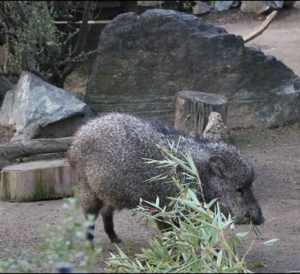
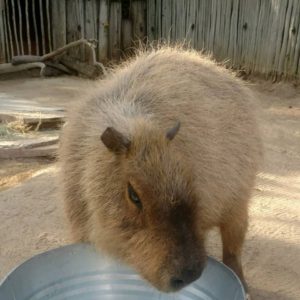
Eloise the peccary and Meenie, our elderly capybara, get a lot of attention, training and enrichment from staff to keep them occupied and happy. When zoos are unable to match a suitable exhibit mate with a single animal, the zookeepers take extra time and attention to ensure that their social and mental needs are met. Introducing younger animals to a geriatric one can be dangerous – even if they get along. The zoo staff continues to look for possible matches for these older animals in hopes that a suitable companion will become available.
Some of our other elderly and retirement animals include:
- The retirement goat herd
- Chloe – 20 year old dwarf zebu
- Vangy and Vaky – 23 and 24 year old ring tailed lemurs
- Edmund and Dart – Barbary dove education ambassadors, both 20+
- Zoe – 17 year old prehensile tailed porcupine
- Friendly and Jackson – Turkey vultures, both 20 +
- Ulysses – Retired 44 year old Sulphur Crested Cockatoo
- Sophia – 17 year old jaguar. Staff monitor her health closely and makes sure that she gets lots of enrichment and training to keep her physically and mentally stimulated.